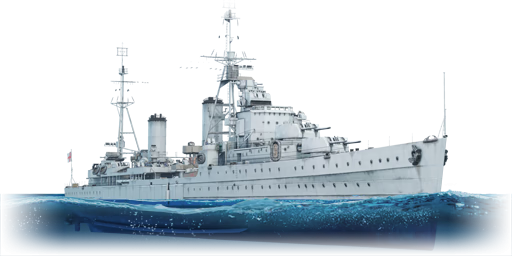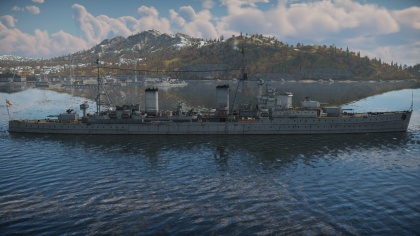HMS Arethusa
Contents
Description
The Arethusa-class, HMS Arethusa (26), 1943 is a rank III British cruiser
with a battle rating of 5.0 (AB) and 5.3 (RB/SB). It was introduced in Update 1.91 "Night Vision".
General info
Survivability and armour
Talk about the vehicle's armour. Note the most well-defended and most vulnerable zones, e.g. the ammo magazine. Evaluate the composition of components and assemblies responsible for movement and manoeuvrability. Evaluate the survivability of the primary and secondary armaments separately. Don't forget to mention the size of the crew, which plays an important role in fleet mechanics. Save tips on preserving survivability for the "Usage in battles" section. If necessary, use a graphical template to show the most well-protected or most vulnerable points in the armour.
Mobility
Write about the ship's mobility. Evaluate its power and manoeuvrability, rudder rerouting speed, stopping speed at full tilt, with its maximum forward and reverse speed.
Armament
Primary armament
Provide information about the characteristics of the primary armament. Evaluate their efficacy in battle based on their reload speed, ballistics and the capacity of their shells. Add a link to the main article about the weapon: {main|Weapon name (calibre)}. Broadly describe the ammunition available for the primary armament, and provide recommendations on how to use it and which ammunition to choose.
Secondary armament
Some ships are fitted with weapons of various calibres. Secondary armaments are defined as weapons chosen with the control Select secondary weapon. Evaluate the secondary armaments and give advice on how to use them. Describe the ammunition available for the secondary armament. Provide recommendations on how to use them and which ammunition to choose. Remember that any anti-air armament, even heavy calibre weapons, belong in the next section. If there is no secondary armament, remove this section.
Anti-aircraft armament
An important part of the ship's armament responsible for air defence. Anti-aircraft armament is defined by the weapon chosen with the control Select anti-aircraft weapons. Talk about the ship's anti-air cannons and machine guns, the number of guns and their positions, their effective range, and about their overall effectiveness – including against surface targets. If there are no anti-aircraft armaments, remove this section.
Torpedo armament
Torpedoes launchers are standard equipment on many ships and boats. Torpedoes are a significant means of defeating an opponent. Evaluate the position of the torpedo launchers, discuss the ammunition available, firing specifics such as dead zones, features of the torpedoes themselves, etc. If there is no torpedo armament, remove this section.
Usage in battles
Describe the technique of using this ship, the characteristics of her use in a team and tips on strategy. Abstain from writing an entire guide – don't try to provide a single point of view, but give the reader food for thought. Talk about the most dangerous opponents for this vehicle and provide recommendations on fighting them. If necessary, note the specifics of playing with this vehicle in various modes (AB, RB, SB).
Modules
| Tier | Seakeeping | Unsinkability | Firepower | |||
|---|---|---|---|---|---|---|
| I | Dry-Docking | Tool Set | 6 inch CPBC | 4 inch SAP | Anti-Air Armament Targeting | |
| II | Rudder Replacement | Fire Protection System | Smokescreen | 6 inch HE-TF | 4 inch HE-TF | Auxiliary Armament Targeting |
| III | Propeller Replacement | Shrapnel Protection | Ventilation | Improved Rangefinder | 4 inch HE-VT | Primary Armament Targeting |
| IV | Engine Maintenance | New Pumps | Ammo Wetting | 6 inch HE-VT | Torpedo Mode | |
Pros and cons
Summarise and briefly evaluate the vehicle in terms of its characteristics and combat effectiveness. Mark its pros and cons in the bulleted list. Try not to use more than 6 points for each of the characteristics. Avoid using categorical definitions such as "bad", "good" and the like - use substitutions with softer forms such as "inadequate" and "effective".
Pros:
Cons:
History
The development of the Arethusa-class light cruisers began because their predecessors - type Leander ships, were not very suitable for fleet operations at sea nor as a lead destroyer. Type Leander cruisers didn’t have the maneuverability to be leaders, nor did they meet the minimum silhouette requirements for night operations. British engineers had to create a new, lighter, and more maneuverable ship based on the Leander.
The result of this endeavour was the creation of the Arethusa-class in the early 1930s - a light cruiser design based on the Leander-class, with reductions in firepower, protection and other aspects to accomodate for weight savings. The design was soon approved for construction, with six ships being initially ordered, although five were actually built in the end.
HMS Arethusa, the lead ship of her class, was laid down in January 1933, being commissioned in May 1935. Upon her completion, HMS Arethusa was immediately assigned to the Mediterranean, where she would also witness the outbreak of WWII in September 1939. Early in the war, HMS Arethusa operated off the coast of Norway, assisted in the evacuation of troops from France in 1940 and protected numerous Allied convoys in the Atlantic and Mediterranean.
Later in the war, in 1942, HMS Arethusa suffered heavy damages as a result of an airborne torpedo attack by axis forces, knocking the ship out of action for almost 2 years before finally being repaired in the US. Arethusa’s final major operation of WWII were the Allied landings in Normandy in 1944. HMS Arethusa was put in reserve in the immediate postwar years and was later scrapped in May 1950.
- From Devblog
Media
Excellent additions to the article would be video guides, screenshots from the game, and photos.
See also
Links to articles on the War Thunder Wiki that you think will be useful for the reader, for example:
- reference to the series of the ship;
- links to approximate analogues of other nations and research trees.
External links
| Britain light cruisers | |
|---|---|
| Emerald-class | HMS Enterprise |
| Dido-class | HMS Dido |
| Leander-class | HMNZS Leander |
| Arethusa-class | HMS Arethusa |
| Town-class | HMS Belfast · HMS Liverpool · HMS Southampton |
| Tiger-class | HMS Tiger |
| Abdiel-class* | HMS Abdiel |





